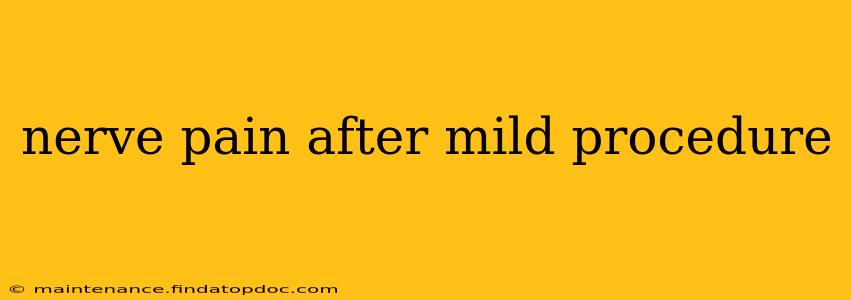Experiencing nerve pain after a seemingly minor medical procedure can be unsettling. While many procedures are low-risk, the possibility of nerve damage, however slight, exists. This comprehensive guide explores the causes of post-procedure nerve pain, effective treatment options, and the path to recovery. We'll also address common questions surrounding this issue.
What Causes Nerve Pain After a Minor Procedure?
Nerve pain, or neuralgia, following a minor procedure can stem from several factors. The most common cause is iatrogenic nerve injury, meaning accidental damage during the procedure itself. This can happen even with minimally invasive techniques. The injury might be direct, involving a cut or compression of the nerve, or indirect, resulting from inflammation or swelling near the nerve.
The type of procedure significantly impacts the risk. For example, procedures involving injections near nerves (like epidurals or dental work) carry a higher risk than superficial procedures. The skill and experience of the healthcare professional performing the procedure also play a crucial role in minimizing this risk.
Other potential causes, though less common, include:
- Inflammation: The body's inflammatory response to the procedure can sometimes irritate nearby nerves, causing pain.
- Scar tissue: Scar tissue formation around a nerve can compress it, leading to pain. This is more likely to occur with more invasive procedures.
- Pre-existing conditions: Individuals with underlying nerve conditions may be more susceptible to post-procedure nerve pain.
How Long Does Nerve Pain After a Minor Procedure Last?
The duration of nerve pain varies widely depending on the severity of the nerve injury and individual healing responses. Mild nerve irritation might resolve within a few days or weeks. More significant nerve damage can cause pain lasting for months or, in rare cases, even longer. Early intervention and proper treatment are crucial for minimizing the duration of pain and promoting optimal recovery.
What Are the Treatment Options for Nerve Pain After a Minor Procedure?
Treatment options for post-procedure nerve pain range from conservative approaches to more interventional therapies. The choice of treatment depends on the severity of the pain, its duration, and the underlying cause.
Conservative Treatments:
- Over-the-counter pain relievers: Medications like ibuprofen or acetaminophen can help manage mild to moderate pain.
- Topical creams: Creams containing lidocaine or capsaicin can provide localized pain relief.
- Physical therapy: Physical therapy exercises can help improve nerve function and reduce pain by improving flexibility and reducing inflammation.
- Rest and elevation: Resting the affected area and keeping it elevated can reduce swelling and pain.
More Interventional Treatments:
- Prescription medications: If over-the-counter pain relievers are insufficient, a doctor might prescribe stronger pain medications, including opioids (used cautiously due to potential side effects), anti-seizure medications, or antidepressants (which can be effective for nerve pain).
- Injections: Corticosteroid injections can help reduce inflammation around the nerve. Nerve blocks might be used to temporarily numb the affected area.
- Surgery: In rare cases of severe or persistent nerve damage, surgical intervention might be necessary to repair the nerve or alleviate pressure on it.
Can Nerve Pain After a Minor Procedure Be Prevented?
While not all nerve injuries are preventable, several steps can significantly reduce the risk:
- Choosing experienced healthcare professionals: Select healthcare providers with a proven track record and expertise in the specific procedure.
- Open communication: Discuss any concerns or pre-existing conditions with your doctor before the procedure.
- Following post-procedure instructions carefully: Adhering to the doctor's instructions regarding rest, medication, and activity levels is vital for optimal healing.
Is Nerve Pain After a Minor Procedure Permanent?
In most cases, nerve pain after a minor procedure is not permanent. With appropriate treatment and diligent adherence to post-procedure care, most individuals experience complete or significant pain relief. However, the possibility of lingering pain or long-term nerve damage exists, particularly with severe injuries. Early intervention and proactive management are key to preventing long-term complications.
What Should I Do if I Experience Nerve Pain After a Minor Procedure?
If you experience nerve pain following a minor procedure, contact your healthcare provider immediately. Describe your symptoms in detail, including the location, intensity, and duration of the pain. Early diagnosis and intervention are critical for successful management and improved recovery outcomes. Don't hesitate to seek medical attention—prompt action often leads to the best results.
This information is for general knowledge and does not constitute medical advice. Always consult with a qualified healthcare professional for diagnosis and treatment of any medical condition.
